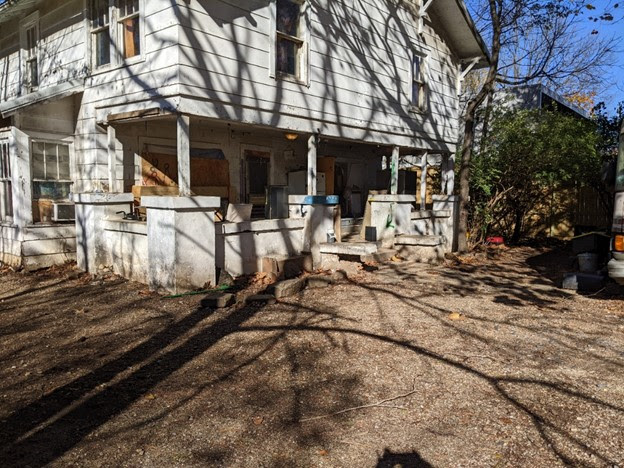Gladys Tiffany, Director Omni Center for Peace Justice & Ecology
Many of you have seen stories out about the property by the National Cemetery that Richard and Gladys Tiffany own. After a year of wrangling about a camp of homeless people there, and another year of cleaning up, now the city has decided to declare it a nuisance and condemn it. AND the apartment complex across the street is suing us for multiple problems. We know you’re wondering what’s going on.
I haven’t wanted to take space in this newsletter meant to focus on community activities that encourage peace, justice and environmental sustainability, but since there are so many negative stories flying around, you’d probably like to hear another side of the story.
Short History
We’ve owned that old house since 2002, and it’s been divided up into four apartments, rented to low-income people for decades. We lived in it until 2010. It’s not fancy, but warm, dry, all the utilities work etc. In 2011 a new student apartment was built across the road where the old cattle sale barn used to be, and the neighborhood has been gentrifying since then.
When my husband Richard and I were young hippies we both had life experiences of living unhoused, and it gave us a sense of how hard it could be. Years after we bought that property, Richard befriended a homeless man and like other good Omni folk, let him quietly camp in the back. He’s a very friendly guy, and like Richard, is gentle and big-hearted.
Remember that when covid started an unnerving number of evictions happened, even after a moratorium had been declared. Within a few months of the pandemic, new tents started appearing on our land. I guess some people would have sent them packing. But at the time, Richard wasn’t ready to do that. Where else would they go? By then there were already camps springing up along the bike trails and woods, and the city was doing “sweeps” where the Park Service and the Police would go in and scrape everything in a camp into a trash truck and leave the destitute people in even worse straights. Anything they have left from their former life was just scraped away. It’s horribly traumatic for them.
Trauma’s a sad part of living on the street. Everyone’s vulnerable and afraid. It can be a situation ripe for mentally unstable people to become violent, or abuse drugs and alcohol to try and cope. Almost nobody can maintain any sense of stability under those conditions. But many people have told us that the sweeps, and the police forcing them to move every couple of weeks, was the most traumatic thing of all.
Our police are actually somewhat kinder than in some places, at least they say they’re trying to be. But they have a mean job to do. When they interact with homeless people they tend to see them as “outcasts,” because they are. Being without a home means they’ve fallen through the last shred of the safety net that holds the rest of us inside a system protecting acceptable humanity. When they fall through that housing net the system works against them. Other countries have more caring ways. The richest country in the history of the world should do better!
How do they cope? Something we’ve seen over and over as we get to know homeless people is how many ways they take care of each other. Their lives may be falling apart, but most are good-hearted people, and as much as they can, the vulnerable are watching out for the even more vulnerable.
As people of peace, Omni people tend to believe in the common good, and feel that society has a responsibility for keeping the safety net strong. It ‘s meant to protect everybody! But over the last 40 years leaders of our country have turned their backs on the vulnerable, and left communities to scramble for help where they can. So here we are.
It appears that this tale is too complex to be a single article. It may be better to give more detail over a couple of newsletters than to spin it out eternally in one episode. Guess there needs to be a follow-up next week.
The homeless camp that resulted from all this closed on August 6 2023. There are no more campers living on the Tiffany property, in spite of what claims are made. There are 8 kindly people of limited means and generally poor health renting the 4 apartments. Not criminals and prostitutes.
The short , unvarnished version of our perspective on these lawsuits is this: there is manipulation going on behind the scenes from people who want to take over our property, which has become valuable. They’re exploiting a situation that we should have handled differently, but is actually being dealt with responsibly, in cooperation with the city’s Code Compliance Department, and with care for the low-income renters living there. Richard is doing what he can in spite of city pressure and manipulation from self-interested parties.
Next week I’ll share details about what leads us to this understanding. An important part of the story involves very real suggestions for moving forward in a better way.
Fayetteville could also have handled things differently. She still can.

